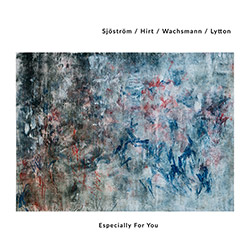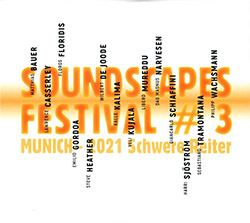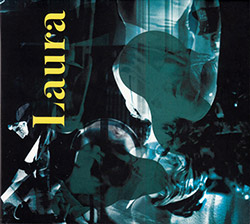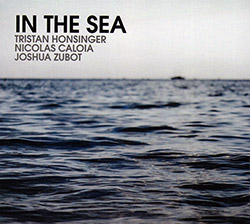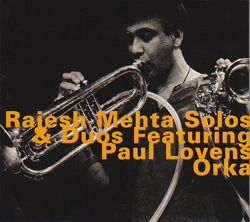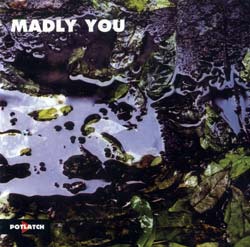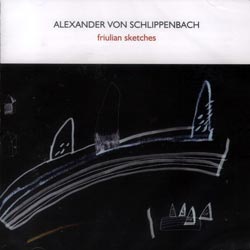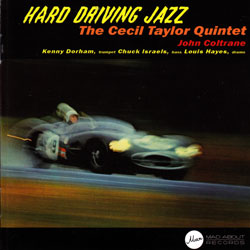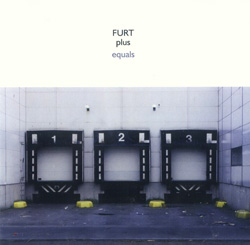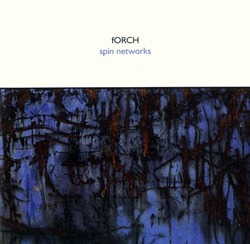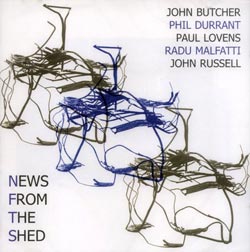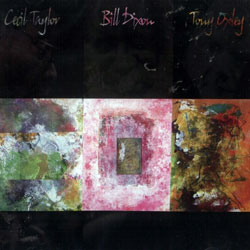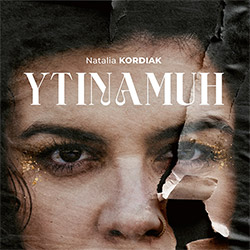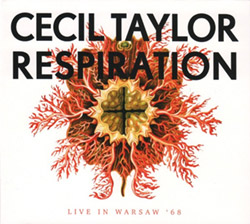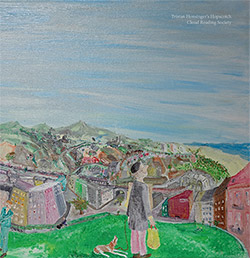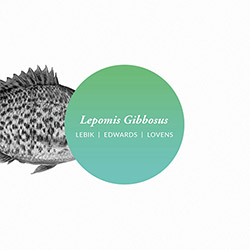
Though not well documented, free jazz legendary pianist Cecil Taylor's working band for 3 years in the late nineties was this quintet of Harri Sjostrom on soprano saxophone, Tristan Honsinger on cello, Teppo Hauta-aho on double bass, and Paul Lovens on drums, cymbals & gongs, heard in this energetic concert at Tampere Jazz Happening in Finland, 2018.
Save $1.70
In Stock
Quantity in Basket: None
Log In to use our Wish List
Shipping Weight: 2.00 units
Sample The Album:
Cecil Taylor-piano
Harri Sjostrom-soprano saxophone
Tristan Honsinger-cello
Teppo Hauta-aho-double bass
Paul Lovens-drumset, cymbals, gongs
Click an artist name above to see in-stock items for that artist.
UPC: 5905279364882
Label: Listen! Foundation (Fundacja Sluchaj!)
Catalog ID: FRS 01 | 2021
Squidco Product Code: 29973
Format: CD
Condition: New
Released: 2021
Country: Poland
Packaging: Cardboard Gatefold
Recorded live at Tampere Jazz Happening, in Tampere, Finland, on October 30th,1998, by the Finnish Broadcasting Company YLE.
"By the time of his first substantive engagement with European improvisors, Cecil Taylor was 59. He had consolidated his approach into the most radical piano concept of the twentieth century, music so personal that it was sometimes hermetic, so disciplined it felt like a principle, so wild it proposed quantum potential. When he worked in a group Ð or as he preferred to call it, a unit Ð he was an uncompromising collaborator; anyone playing with him had to put up or shut up or just get left in the wake. Work with CT was not taken lightly.
In 1988, FMPÕs Jost Gebers organized a month-long Berlin residency for Taylor, a summit with leading figures of improvisation in Europe, among them Paul Lovens and Tristan Honsinger. Two years later, during informal morning rehearsals with subsets of a large workshop band, saxophonist Harri Sjšstršm imagined a smaller unit. ÒWarming up in the mornings it was very free, no one was under any pressure and there was no leader. I thought perhaps it could be possible to put together a group with Cecil Taylor and have this freedom, just like in a European free improvising group.Ó Sjšstršm mustered the courage to propose this to Cecil, who was immediately receptive. After several versions, one lineup congealed into a working band: Taylor, Sjšstršm, Lovens, Honsinger, and Finnish bassist and composer Teppo Hauta-aho. Sjšstršm, Hauta-aho, and Lovens worked together in Quintet Moderne, and all had played extensively with Honsinger. ÒI remember very well Cecil saying that this is the best band he ever had,Ó says Sjšstršm. ÒThen he said: No this is our band.Ó
I was fortunate to catch this group in October 1997 in Stockholm. The crux of it was the unified force of Taylor and Lovens Ð magnificently combustible, of course, but among cresting and crashing waves so much color and detail. Hauta-aho, whose music I only knew from a few records, was impressive Ð he could add to the rhythmic dialogue without muddying it, no mean feat. Against this momentum, Tristan Honsinger was able, sometimes quite abruptly, to divert things. Tristan has a dada streak. Along with his inimitable cello, heÕll often mumble and sing nonsense Ð improvised concrete poetry Ð a fascinating combination with TaylorÕs sinewy vocalizations. SjšstršmÕs soprano saxophone penetrated the densest thicket Ð tonal strata, whirligig whorls, or staccato honking, HarriÕs judicious, thoughtful, economical.
Hearing this recording from a festival appearance a year later, almost to the day, I am brought back to what made the band so singular. The playing grows concentrated and then thins out, biomorphically, like fluid moving between cells, hitting a membrane, finding it permeable, squeezing through, turgid, bursting, flowing again. TaylorÕs concept was an inspiration for several generations of free improvisors in Europe. He created a vocabulary unique to him, an individual language. CecilÕs gauntlet: no matter what instrument, make your own mother tongue. This path was chosen by many European improvisors Ð premium was on personal voice and its deployment in collective contexts. Here was a band with four such players, devoted to his music yet knowing that to be a Cecil apostle means being devoted to themselves, to their own personal languages.
Everyone listens, instigates, and responds Ð five individuals working together to build a group sound. A unit in the complete meaning: its parts are united; its diversity reflects a unity. Our band."-John Corbett, Chicago, June 2020

The Squid's Ear!
Artist Biographies
• Show Bio for Cecil Taylor "Cecil Percival Taylor (March 25, 1929 Ð April 5, 2018) was an American pianist and poet. Classically trained, Taylor is generally acknowledged as having been one of the pioneers of free jazz. His music is characterized by an extremely energetic, physical approach, producing complex improvised sounds, frequently involving tone clusters and intricate polyrhythms. His piano technique has been likened to percussion, for example described as "eighty-eight tuned drums" (referring to the number of keys on a standard piano). He has also been described as "like Art Tatum with contemporary-classical leanings". aylor was raised in the Corona, Queens neighborhood of New York City. As an only child to a middle-class family, Taylor's mother encouraged him to play music at an early age. He began playing piano at age six and went on to study at the New York College of Music and New England Conservatory. At the New England Conservatory, Taylor majored in composition and arranging. During his time there, he also became familiar with contemporary European art music. Bartok and Stockhausen notably influenced his music. In 1955, Taylor moved from Boston to New York City. He formed a quartet with soprano saxophonist, Steve Lacy, the bassist Buell Neidlinger, and drummer Dennis Charles. Taylor's first recording, Jazz Advance, featured Lacy and was released in 1956. It is described by Cook and Morton in the Penguin Guide to Jazz: "While there are still many nods to conventional post-bop form in this set, it already points to the freedoms in which the pianist would later immerse himself." Taylor's Quartet featuring Lacy also appeared at the 1957 Newport Jazz Festival which went on to be made into the album At Newport. He collaborated with saxophonist John Coltrane in 1958 (Stereo Drive, currently available as Coltrane Time). 1950s and 1960s Throughout the 1950s and 1960s, Taylor's music grew more complex and moved away from existing jazz styles. Gigs were often hard to come by, and club owners found Taylor's approach to performance (long pieces) unhelpful in conducting business. His 1959 LP Looking Ahead!, showcased his innovation as a creator in comparison to the jazz mainstream. Unlike others at the time, Taylor utilized virtuosic techniques and made swift stylistic shifts from phrase to phrase. These qualities, among others, still remain notable distinctions of Taylor's music today. Landmark recordings, like Unit Structures (1966), also appeared. With 'the Unit', musicians developed often volcanic new forms of conversational interplay. In the early 1960s, an uncredited Albert Ayler worked for a time with Taylor, jamming and appearing on at least one recording, Four, unreleased until 2004. By 1961, Taylor was working regularly with alto saxophonist Jimmy Lyons, one of his most important and consistent collaborators. Taylor, Lyons and drummer Sunny Murray (and later Andrew Cyrille) formed the core personnel of The Unit, Taylor's primary group effort until Lyons's premature death in 1986. Lyons's playing, strongly influenced by jazz icon Charlie Parker, retained a strong blues sensibility and helped keep Taylor's increasingly avant garde music tethered to the jazz tradition. Solo concerts Taylor began to perform solo concerts in the second half of the sixties. The first known recorded solo performance (by Dutch radio) was 'Carmen With Rings' (59 min.) in De Doelen concert hall in Rotterdam on July 1, 1967. Two days before Taylor had played the same composition in the Amsterdam Concertgebouw. Many of the later concerts were released on album and include Indent (1973), side one of Spring of Two Blue-J's (1973), Silent Tongues (1974), Garden (1982), For Olim (1987), Erzulie Maketh Scent (1989) and The Tree of Life (1998). He began to garner critical, if not popular, acclaim, playing for Jimmy Carter on the White House Lawn, lecturing as an in-residence artist at universities, and eventually being awarded a Guggenheim Fellowship in 1973 and then a MacArthur Fellowship in 1991. 1990s and the Feel Trio Following Lyons's death in 1986 Taylor formed the Feel Trio in the early 1990s with William Parker (bass) and Tony Oxley (drums); the group can be heard on Celebrated Blazons, Looking (Berlin Version) The Feel Trio and the 10-CD set 2 T's for a Lovely T. Compared to his prior small groups with Jimmy Lyons, the Feel Trio had a more abstract approach, tethered less to jazz tradition and more aligned with the ethos of European free improvisation. He also performed with larger ensembles and big-band projects. His extended residence in Berlin in 1988 was extensively documented by the German label FMP, resulting in a massive boxed set of performances in duet and trio with a who's who of European free improvisors, including Oxley, Derek Bailey, Evan Parker, Han Bennink, Tristan Honsinger, Louis Moholo, Paul Lovens, and others. Most of his latter day recordings have been put out on European labels, with the exception of Momentum Space (a meeting with Dewey Redman and Elvin Jones) on Verve/Gitanes. The classical label Bridge released his 1998 Library of Congress performance Algonquin, a duet with violinist Mat Maneri. Taylor continued to perform for capacity audiences around the world with live concerts, usually played on his favored instrument, a Bšsendorfer piano that features nine extra lower-register keys. A documentary entitled All the Notes, was released on DVD in 2006 by director Chris Felver. Taylor was also featured in an earlier documentary film Imagine the Sound (1981), in which he discusses and performs his music, poetry and dance. 2000s At Moers Festival 2008 Taylor recorded sparingly in the 2000s, but continued to perform with his own ensembles (the Cecil Taylor Ensemble and the Cecil Taylor Big Band) as well as with other musicians such as Joe Locke, Max Roach, and the poet Amiri Baraka. In 2004, the Cecil Taylor Big Band at the Iridium 2005 was nominated a best performance of 2004 by All About Jazz, and the same in 2009 for the Cecil Taylor Trio at the Highline Ballroom in 2009. The trio consisted of Taylor, Albey Balgochian, and Jackson Krall. At time of Taylor's death in 2018A an autobiography, further concerts, and other projects were in the works. In 2010, Triple Point Records released a deluxe limited edition double LP titled Ailanthus/Altissima: Bilateral Dimensions of Two Root Songs, a set of duos with long-time collaborator Tony Oxley that was recorded live at the Village Vanguard in New York City. In 2013, he was awarded the Kyoto Prize for Music. In 2014, his career and 85th birthday were honored at the Painted Bride Art Center in Philadelphia with the tribute concert event "Celebrating Cecil". In 2016 he received a retrospective at the Whitney Museum of American Art entitled Open Plan: Cecil Taylor. Taylor, along with dancer Min Tanaka was the subject of Amiel Courtin-Wilson's 2016 documentary film "The Silent Eye". Ballet and dance In addition to piano, Taylor was always interested in ballet and dance. His mother, who died while he was still young, was a dancer and also played the piano and violin. Taylor once said: "I try to imitate on the piano the leaps in space a dancer makes." He collaborated with dancer Dianne McIntyre in the late 70s and early 80s. In 1979 he also composed and played the music for a twelve-minute ballet "Tetra Stomp: Eatin' Rain in Space", featuring Mikhail Baryshnikov and Heather Watts. Poetry Taylor was a poet, citing Robert Duncan, Charles Olson and Amiri Baraka as major influences. He often integrated his poems into his musical performances, and they frequently appear in the liner notes of his albums. The CD Chinampas, released by Leo Records in 1987, is a recording of Taylor reciting several of his poems, accompanying himself on percussion. Influence and musical style According to Steven Block, free jazz originated with the performances of Cecil Taylor at the Five Spot Cafe in 1957 and Ornette Coleman in 1959. In 1964, Taylor co-founded the Jazz Composers Guild to enhance the working possibilities of avant-garde jazz musicians. Taylor's style and methods have been described as 'constructivist'. Despite Scott Yanow's warning regarding Taylor's "forbidding music": Suffice it to say that Cecil Taylor's music is not for everyone he goes on to praise Taylor's "remarkable technique and endurance," and his "advanced", "radical", "original", and uncompromising "musical vision." This vision is one of Taylor's greatest influences upon others: Playing with Taylor I began to be liberated from thinking about chords. I'd been imitating John Coltrane unsuccessfully and because of that I was really chord conscious. Ñ Archie Shepp, quoted in LeRoi Jones, album liner notes for Four for Trane (Impulse A-71, 1964). Personal life In 1982, jazz critic Stanley Crouch outed Taylor as being gay, prompting an angry response. However, Taylor never denied it. In 1991, Taylor told a New York Times reporter "[s]omeone once asked me if I was gay. I said, 'Do you think a three-letter word defines the complexity of my humanity?' I avoid the trap of easy definition." Taylor moved to Fort Greene, Brooklyn in 1983. Death Taylor died on April 5. 2018 at tbe age of 89." ^ Hide Bio for Cecil Taylor • Show Bio for Harri Sjostrom "Harri Sjöström (soprano & sopranino saxophone) Born 29 February 1952 in Turku, Finland. Played piano, guitar and drums in his childhood. Studied music and fine art photography in San Francisco from 1974 - 1978; later film studies at the San Francisco Art Institute. Saxophone and flute with Harry Man, Leo Wright, Friedhelm Schönfeld, Steve Lacy; further piano studies at the San Francisco Conservatory; attended special class for contemporary improvised music at the Lone Mountain College led by trombonist Johannes Mager; composition studies at the electro acoustic music department at Hochschule Für Musik Wien, Austria; composition class led by composers Prof. Haubenstock-Ramati and Prof. Friedrich Cerha. The joyful, creative and intensive experiences with contemporary music, contemporary improvised music studies, and visual art studies captivated him so much that he has worked intensively ever since with contemporary improvised music, precent tme composition and in mixed media projects including film, photography, visual arts, theater and dance. Has participated in master courses and workshops held by John Cage, George Russell, Steve Lacy, Bill Dixon, Daniel Kientzy, Vinko Globokar, Evan Parker, Cecil Taylor. In 1980 -1985 he lived in Vienna, Austria, which became his doorway to the European contemporary music scene; formed his first groups and organized numerous artist exchange-projects in Finland and elsewhere. Brought many most notable innovators on the international contemporary improvisation scene to Finland. One of his early projects included a tour with Derek Bailey Company, which was their first in Finland; Bailey's visit in Finland was largely commented by the finish press as "the occurrence" of the year in the contemporary music scene; moved to Berlin in 1985. Founded the international Quintet Moderne and; co-founded the The Player Is -trio with Teppo Hauta-aho and Philipp Wachsmann, Harri Sjöström as well as founding the groups: Quartetto Finlandia, Wait, Motström, Up and Out, ECIO, (European Composers Improvisors Orchestra), Sestetto Internazionale; Trio Internazionale; co-founded the MOVE - quintet; City Of Pyramids -Casserley, DJ Illvibe, Morgan, Sjöström; since 1989 in collaboration with the British guitarist John Russell in Russells international Mopomoso (MOdernism POstMOdernism) projects. In 1990, Harri met Cecil Taylor in Berlin and has an extensive working relationship with the legendary pianist and composer on many projects like; Cecil Taylor Quintet Desperados: (Cecil Taylor, Paul Lovens, Teppo Hauta-aho, Tristan Honsinger, Harri Sjöström) Cecil Taylor Quartet- Qua, Cecil Taylor "New Unit" : (Cecil Taylor, Tony Oxley, Okkyung Lee, Jackson Krall, Harri Sjöström); and five recording releases with different C.T. ensembles; since the late 70s Harri performed at numerous international jazz and contemporary music festivals. Additional collaborations in different projects with a.o. Bernahrd Arndt, James Andean, Yoko Arai, Matthias Bauer, Guy Bettini, Tony Buck, Sergio Castrillón, Angelo Contini, Markus Fagerudd, Emilio Gordoa, Frank Gratkowski, Teppo Hauta-aho, Steve Heather, Tristan Honsinger, Kalle Kalima, Achim Kaufmann, Veli Kujala, Jukka Kääriäinen, Okkyung Lee, Francesco Miccolis, Gianni Mimmo, Dag Magnus Narvesen, Heikki Nikula, Adam Pultz Melbye, Luca Pissavini, Günter Baby Sommer, Jone Takamäki, Janne Tuomi; Occasionally performs solo and is involved in making film music.""Harri Sjöström has been a saxophone teacher since 1980 and is a vital member of the European contemporary improvised music scene; he has composed music for film and is still active today with his photography." ^ Hide Bio for Harri Sjostrom • Show Bio for Tristan Honsinger "Tristan Honsinger told Kevin Whitehead, 'I grew up in New England, took up cello at age nine in Springfield, Massachusetts... My first teacher was a Dutch Jew. Almost all my teachers were European immigrants. Later I went to the New England Conservatory. It was quite a good school, but I didn't feel very welcome, so I went to Peabody Conservatory in Baltimore from '68 to '69. By then I'd had it, really, with the whole classical music world. I changed teachers so many times, I suppose I was confused by their contradictory advice'. It was after moving to Montreal in 1969 that Honsiner began improvising and, after meeting Dutch percussionist Peter van Ginkel and listening to his copy of Topography of the lungs, decided he could play this music and uprooted to Europe, moving to Amsterdam in 1974: 'They arrested me the first time I played my cello in the street... confiscated our instruments'. As a result, he moved to Paris, travelled around France, eventually finding his way back to Amsterdam where he began playing with Maarten van Regteren Altena, Han Bennink and Misha Mengelberg as well as being involved in Derek Bailey's Company Weeks and playing with Globe Unity. The late '70s and early '80s were spent in Italy with Katie Duck, working with theatre - Duck had her group the Great Salt Lake Mime Troupe - and Italian and Sardinian musicians. During this time, Honsinger started his group This, That and the Other, the early version including Tiziana Simona, Sean Bergin, Toshinori Kondo, Jean-Jacques Avenel and Michael Vatcher which recorded Picnic in Amsterdam in 1985. 'Because of a promoter's brilliant organising, the group kind of fell apart', but there have been fairly regular and recent incarnations, including an appearance at the Italian Angelica Festival in 1996. Since the memorable set of concerts in Berlin in 1988, released on the much sought-after FMP box set, Honsinger has been a fairly regular member of Cecil Taylor's groups. At those concerts, Honsinger performed in a trio with Taylor and Evan Parker as well as being a member of the large European Orchestra but since then he has been a member of various Taylor groups, including the now-disbanded European Quartet with Harri Sjöström and Paul Lovens, including an unusual combination that performed at the Total Music Meeting in November 1999: the Cecil Taylor Ensemble with Franky Douglas, Tristan Honsinger and Andrew Cyrille." ^ Hide Bio for Tristan Honsinger • Show Bio for Teppo Hauta-aho "Finnish composer and bassist Teppo Hauta-aho, is the most prolific bass composer of our time and since the 1970s has composed almost 300 works for double bass - spanning the entire range of standards from beginner to virtuoso. Teppo Hauta-aho was born in 1941 and studied double bass with Orvo Hyle and Oiva Nummelin in Finland, and Frantisek Posta in Prague. He played with the Helsinki Philharmonic between 1965 and 1972, and the Finnish Opera Orchestra from 1975 to 2000. He is an active recitalist, both classical and jazz, has given more than 300 recitals with his duo partner, Carita Holmström, and is at the cutting edge of modern improvisation - performing with leading improvisers throughout the world. Finnish composer Harry Wessman writes: "As a composer, Teppo Hauta-aho has always been his own teacher, basing his technical knowledge on his wide practical musicianship as an orchestral player, chamber and jazz musician. It would not be an exaggeration to claim that he was the jazz bassist most in demand in Finland in the 1970s, and a few of his works are pure jazz compositions. But the compositional techniques and musical means used in the majority of his works originate in an unusual openness for any devices. Along with modern techniques, his source of inspiration include all the previous stylistic periods in European music, impulses from Oriental music and, of course, jazz. His own instrument, the double bass, has profited especially from his rich inventiveness in finding new means to conjure forth unusual sounds from the instrument, and in applying them in an artistically meaningful and striking way." Hauta-aho's music has been performed extensively in Finland and abroad, notably in America, Britain, Germany, France, Czech Republic, Soviet Union, Australia and Switzerland. His most famous work Kadenza (1978) has achieved cult-like status, is recognised universally as a 20th-century classic, and is the most performed contemporary work for double bass." ^ Hide Bio for Teppo Hauta-aho • Show Bio for Paul Lovens "Born in Aachen, Germany, 6 June 1949; Drums, percussion, musical saw, etc. Paul Lovens played the drums as a child. Self-taught, from the age of 14 he played in groups of various jazz styles and popular musics and from 1969 has worked almost exclusively as an improvisor on individually selected instruments. He has worked internationally with most of the leading musicians in free jazz and free improvisation, among whom have included the Globe Unity Orchestra, the Berlin Contemporary Jazz Orchestra, the Schlippenbach trio, Quintet Moderne, Company, and a duo with Paul Lytton. He has undertaken concert tours in more than 40 countries, is a founder member of a musician's cooperative and has produced recordings for his own label, Po Torch Records since 1976. He has worked with painter Herbert Bardenheuer. Despite very rare solo performances, and although giving occasional concerts with ad-hoc groups and an involvement in projects with film, dance and actors, Paul Lovens' main interest and work is musical improvisation in fixed small groups. In the mid-1990s these small groups numbered around 16, of which a few were part of a special selection, called 'vermögen'. Paul Lovens somehow epitomises the free drummer/percussionist who is not there to lay down the beat and kick everyone else into action but to listen, colour, contribute, guide, and occasionally direct, the overall cooperative sound. In concert one cannot fail to be moved by his intensity and concentration and there is an overiding feeling that even the most random events are somehow planned in time. In this respect, there is a nice irony that on the Nothing to read CD with Mats Gustafsson, Lovens describes his kit as consisting of 'selected and unselected drums and cymbals'. Miking seems to be a problem at times with some recordings giving him undue prominence and others insufficient. Good recordings are Elf bagatellen, Nothing to read, Pakistani pomade, and ,stranger than love." ^ Hide Bio for Paul Lovens
4/17/2024
Have a better biography or biography source? Please Contact Us so that we can update this biography.
4/17/2024
Have a better biography or biography source? Please Contact Us so that we can update this biography.
4/17/2024
Have a better biography or biography source? Please Contact Us so that we can update this biography.
4/17/2024
Have a better biography or biography source? Please Contact Us so that we can update this biography.
4/17/2024
Have a better biography or biography source? Please Contact Us so that we can update this biography.
Track Listing:
1. Desperados 75:33
Improvised Music
Jazz
Free Improvisation
NY Downtown & Metropolitan Jazz/Improv
European Improvisation, Composition and Experimental Forms
Quintet Recordings
Staff Picks & Recommended Items
Top Sellers for 2021 by Customer Sales
Search for other titles on the label:
Listen! Foundation (Fundacja Sluchaj!).




